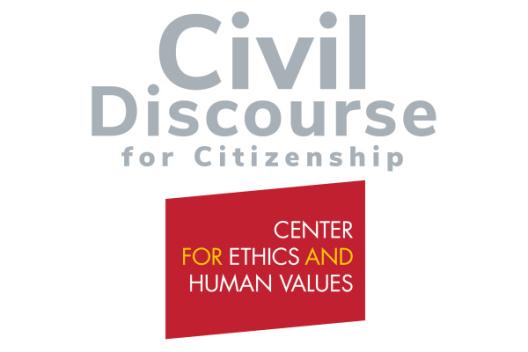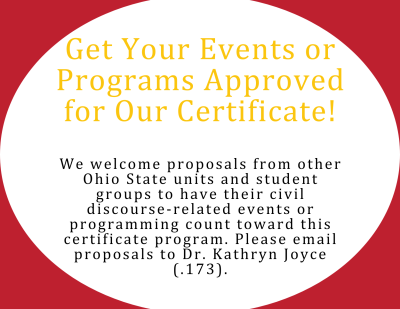Practicing Civil Discourse Co-Curricular Certificate

Practicing Civil Discourse for Citizenship
Co-Curricular Certificate Program
Why enroll?
In an era of contentious politics and ideological polarization, many students are looking for opportunities to engage more constructively in public life. In the spirit of Ohio State’s motto – “Education for Citizenship” – the Practicing Civil Discourse for Citizenship certificate from the Center for Ethics and Human Values (CEHV) offers students the opportunity to learn more about, and to better practice, civil discourse. Students may also wish to demonstrate their commitment to civil discourse to potential employers.
Through coursework, event attendance, and opportunities to participate in a wide range of co-curricular programming, students earn points toward the Practicing Civil Discourse for Citizenship certificate at their own pace. Opportunities to earn points will be regularly updated throughout the academic year, and students can track their progress through our Carmen course.
Students who earn 12 points during their undergraduate career will receive official documentation of their Practicing Civil Discourse for Citizenship certification and will be publicly recognized by the Center for Ethics and Human Values.
How do I get started?
Just fill out this form. Once approved, students may submit materials and track their progress on our Carmen website. Those with questions about the requirements should contact CEHV’s Civil Discourse Program Director, Dr. Kathryn Joyce (.173).
How do I earn points?

Different civil discourse opportunities are assigned different point totals, depending on the level of engagement involved. Each of the opportunities below is listed on our Carmen website, where students will report their participation or attendance.
For some opportunities, such as attending events, students will be asked to submit a brief 150-word reflection about their experience. Other opportunities, such as coursework or participation in a dialogue facilitation workshop, do not require written reflections.
6 points
- Take CEHV’s 3-credit ARTSSCI 2400/2400E course on civil discourse
- Serve as a Civil Discourse Fellow (competitive fellowship; eight fellowships per year)
3 points
- Take a 1-credit “Difficult Conversations” skill-building course: LAW 4015-10 or LAW 4015-20
- Participate in one of IDEA’s “Shop Class for Democracy” online forums
- Complete the Carmen Canvas course on the 4Cs
- Work with CEHV to organize an event with a student program or organization
- Participate in a CEHV-led dialogue facilitation or skill-building workshop
- Attend 6 or more PPE Society meetings or Ethics Bowl practices
2 points [requires submission of 150-word reflection]
- Attend a student-moderated CEHV Civil Discourse Forum
- Organize a civil discourse-related outreach or service initiative (e.g., get out the vote)
1 point [requires submission of 150-word reflection]
- Attend a CEHV-approved civil discourse event (list of approved events is available on Carmen)
Students may also propose coursework, a research project, or other activities to be considered for credit toward the Practicing Civil Discourse for Citizenship certificate. Students should submit a proposal through Carmen with a description of the course (including syllabus), research, or other activity, along with a brief explanation of why they believe it should count toward the certificate.
Click HERE to Enroll!
Enrolling involves filling out a simple Google form with basic information. Students may enroll at any time.
Recipients of the Practicing Civil Discourse for Citizenship Certificate
2025-2026
Hayley Cymerman, Sociology and International Studies (College of Arts and Sciences)
Khushi Jhatakia, Political Science and Public Affairs (College of Arts and Sciences)
Kandace Mcconnell, English (College of Arts and Sciences)
Asher Nathan, Political Science (College of Arts and Sciences)
Ava Nayar, Business Administration (Max M. Fisher College of Business)
Theo Paeper, Psychology (College of Arts and Sciences)
Avah Rodgers, Finance (Max M. Fisher College of Business)
Nathan Snizik, Philosophy, Politics, and Economics (College of Arts and Sciences)
Gracie Turner, Marketing (Max M. Fisher College of Business)
2024-2025
Aliyah Beitzel, Mechanical Engineering (College of Engineering)
Reed Bushbaum, Philosophy, Politics, Economics (College of Arts and Sciences)
Zaynab Huwieh, Microbiology, Pre-Vet track (College of Arts and Sciences)
Victoria Li, Accounting (Fisher College of Business)
Zoe Lightcap, Early Childhood Education, Spanish (College of Education and Human Ecology)
Nilima Patel, Neuroscience (College of Medicine, College of Arts & Sciences)
Vandita Rastogi, Neuroscience and Psychology (College of Arts and Sciences)
Jazayah Wiggins, Sociology and Political Science (College of Arts and Sciences)
Miles Young, Data Analytics (College of Arts and Sciences)
Eric Robinson, Social Work (College of Social Work)
Shefali Sinha, Environmental Science (School of Environment and Natural Resources)
Clovis Westlund, Public Affairs, Sociology (Glenn School and College of Arts and Sciences)
Olive Wilke, PPE and Honors (College of Arts and Sciences)
2023-2024
Kayla Anderson, Political Science (College of Arts and Sciences)
Joe Bjorkman, Philosophy, Politics, Economics (PPE, College of Arts and Sciences)
Cydney Carter, Sociology (College of Arts and Sciences)
Sahana Desai, Marketing (Fisher College of Business)
Izza Haq, Journalism (College of Arts and Sciences: School of Communication)
Muheeb Hijazeen, Industrial and Systems Engineering (College of Engineering)
Ellamarie Jones, Psychology (College of Arts and Sciences)
Elizabeth Lee, Speech and Hearing (College of Arts and Sciences)
Mohamed Manaa, Political Science (College of Arts & Sciences)
Sophia Markley, PPE (College of Arts and Sciences)
Tyler Monk, PPE and Philosophy (College of Arts and Sciences)
Bryan Pogel, Logistics Management (Fisher College of Business)
Elyse Reed, PPE and English (College of Arts and Sciences)
Julia Rizzo, Public Policy (John Glenn College of Public Affairs)
Allison Saghir, Criminology and Psychology (College of Arts and Sciences)
Sarah Spencer, EEDS: Environment, Economy, Development, and Sustainability (College of Food, Agricultural, and Environmental Sciences)
Ed Sweeney, Over 60 Program
Rheanna Velasquez, Neuroscience (College of Medicine, College of Arts and Sciences)
Lillian Wang, PPE (College of Arts and Sciences)
Jack Williams, PPE and Data Analytics (College of Arts and Sciences)
Saed Yousuf, Criminology (College of Arts and Sciences)
